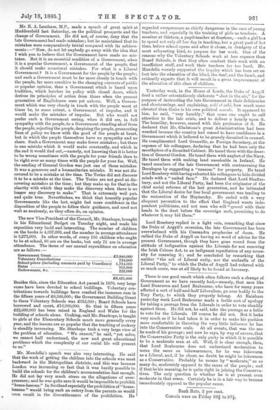Yesterday week, in the House of Lords, the Duke of
Argyll fired a rather ostentatiously elaborate "shot in the air," for the purpose of instructing the late Government in their deficiencies and shortcomings, and explaining, vrbi et orbi, bow much more elevated than theirs is his own political morale. It appeared to him, he said, "very humbly," that some one ought to call attention to the late crisis, and to deliver a homily upon it. The humility, however, ceased with this profession of it. He declared that Mr. Gladstone's great Administration had been wrecked because the country had ceased to have confidence in a Government which it believed to be gravely disunited in counsel. He complimented Lord Granville, as Foreign Secretary, at the expense of his colleagues, declaring that he had been only the mouthpiece of a disunited Cabinet. He taxed them with the deser- tion of General Gordon. He taxed them with neglect of the Navy. He taxed them with making land unsaleable in Ireland. He taxed members of the late Government with contravening the Decalogne by suggesting a "ransom" for property. He taxed Lord Rosebery with having exhorted his colleagues to hide divided minds with a" united face." He declared that Lord Shaftes- bury, and not the Liberal Party, had been the originator of the chief social reforms of the last generation, and he intimated that the Liberal desire for free local government was tending to the restoration of the Heptarchy. He ended with a very eloquent peroration to the effect that England wants inde- pendent politicians, and not men who will "grovel with their heads in the dust before the sovereign mob, promising to do whatever it may bid them."


































 Previous page
Previous page